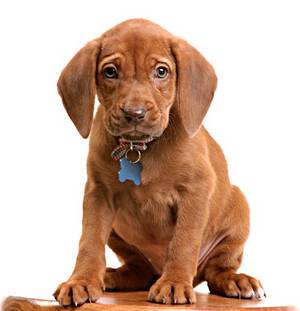How To Potty Train A Puppy

Toilet training your new puppy will take time. The most important things to remember are praising him when he gets it right and not punishing him for mistakes. Be patient - it will happen if you give him the right mesasages.
A new puppy is an exciting edition to any household, and a source of many surprises. However some of the less-pleasant discoveries are the little "deposits" your puppy can leave on the carpet while he or she is figuring out the right place to go to the toilet.
Accidents will happen, and toilet training is a time where you need to be patient and persistent, so the pup can learn appropriate toilet habits.
When training dogs, remember that they will generally choose the behavior offering the best reward for them. Attention, praise, a good scratch or food are all good motivators for dogs. So, the first golden rule of toilet training is to always praise puppies when they go to the toilet in the right place. This reinforces the behavior and helps them learn that this is a good thing to do.
Conversely, the second golden rule is that if you find they have made a mess, don't punish them. Just clean it up and forget about it. Puppies will not understand why they are being punished after the fact. If you catch them in the act, you can tell them "No" firmly and take them to the correct place.
|
"If you find puppies have made a mess, don't punish them. Just clean it up and forget about it."
|
Contrary to popular belief, rubbing his nose in it will not teach him that he is not to go to the toilet in the house, so Pet Shed does not recommend this.
Start housetraining as soon as the puppy arrives. Don't give them a few days to settle in before starting, as that will give them the early message that they are allowed to go to the toilet in the house.
While the puppy is inside, he should be supervised, or in a small confined area, like the bathroom or laundry. Some people prefer to use a crate instead. Crate training uses the principle that dogs do not like to go to the toilet in the same place where they rest or sleep. This can be handy in teaching pets that they can hold on when they feel the urge to go to the toilet and do not have to empty their bowels or bladder immediately if they are not in an appropriate place.
For puppies who are allowed to wander in the house, you will often see a few telltale signs before they go to the toilet - sniffing the ground, turning in circles, perhaps whining as they have a full bladder/bowel. If you see these, take them to the place you want them to urinate/defecate straight away. Then, if they do it correctly, praise them.
puppies are most likely to eliminate within 10-20 minutes of eating or drinking, after playing, or when they wake from a sleep. So take them to the correct place at these times and again, when they go to the toilet appropriately, praise them.
There are a few housetraining aid options to help the learning process along. There are pretreated pads, which are scented with a substance which attracts the puppy to urinate on them. These also absorb a lot of the urine deposited on them, to help keep the mess down.
There is also an item called a "pee post", is a pheromone-treated plastic post which is hammered into the ground. As with the pads, the smell attracts the puppy to go to the toilet there. Housebreaking sprays are also available, which can simply be sprayed on the area desired for the same effect. Once a dog has gone to the toilet in one place a few times, the remaining odor there stimulates him to go in that place again.
One reason why it is so important to clean up accidents properly and remove all traces of puppy urine or feces is to rid the area of the odor. Not only does it smell bad to humans, it might induce the pup to make the same mistake twice, or three times or more! An enzymatic cleaner (which breaks down the urea component of urine, responsible for the attractant smell) is recommended. There are products specifically available for this purpose, such as "Oops Away", "Anti Icky Poo" and others.
There are also repellent products, which can be sprayed in places that you do not want the pup to eliminate. These products smell such that the dog does not want to be in the area or to go to the toilet there. Many smell like citrus fruits, like "Stop Repellent Spray", so are not offensive to humans - but send the desired message to pets.
For successful toilet training for your puppy, remember patience and praise, but never punishment.
�
�
|
References
|
| 1. Luescher AU. Advising Breeders
on Puppy Socialisation. Proceedings Australian Veterinary Association Conference 2006. 2. McGreevy, P. Dog Lover's Companion. Fog City Press, San Francisco CA, USA, 2004 |